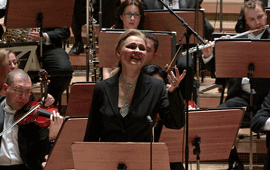> [Archived] Interviews

An Interview with the Mezzo-soprano Ruxandra Donose
We
are truly delighted to be able to see you again on the stage of the
Radio Hall. Before talking about Ariadne
auf Naxos, I would like you to
give us a few details about another performance, the one in which you
have recently participated in Dortmund - La
Concordia de’ Pianeti. What
can you tell us about that production?
It was a special experience because, together with my colleagues and with our expert conductor Andrea Marcon, we have discovered a score which has only been produced once, in 1728, as a first audition. It was a true event, belonging to the history of music. This opera was part of an entire Caldara project. On the two previous evenings there had been two other concerts of Antonio Caldara’s music, also unknown: arias and symphony works. La Concordia de’ Pianeti is a baroque work par excellence, based very much on the ornament, on the way the score’s purpose is to highlight your qualities as a singer. Anyway, I really enjoyed collaborating with colleagues who are experts in the Baroque and especially with the countertenor Franco Fagioli. I have appreciated him for a long time and now I’ve had the chance to work with him and admire him live.
And
shortly after that, you sing music from another century and,
moreover, you sing in another country.
There is no greater distance than the one between what I sang last week and what I am interpreting this week. The Composer in Ariadne is one of my favourite roles. It’s an absolutely amazing part, which brings together the wonderful text of Hugo von Hofmannsthal and the music of Richard Strauss: the ideal of the musician and of the singer, but I think it’s the ideal of the artist in general, the ecstasy, the enthusiasm, the beauty and the passion – all these things are part of this role. Of course it’s a very difficult one, but, at the same time, it’s a part that almost ‘tells’ you how to sing it.
Do
you think that the way you interpret this role changes at every new
approach?
Certain basic ideas remain the same, but every time I interpret it, I obviously do it with a different experience, another maturity and perhaps other sensitivities; that is why each interpretation represents a new joy. This is a score which, if you get to know it really well – it’s, in fact, a never-ending process – gives you such a great and complete joy…It makes you think of your vocation, your calling as an artist.
How
is your collaboration with the Romanian Radio National Orchestra and
with Tiberiu Soare?
It’s a good collaboration and I really enjoy it. That is why I keep coming back: together, we had a lot of beautiful projects. This opera is also difficult for the orchestra, but it’s all in the very capable hands of Tibi Soare.
What
are your next projects?
There will be many different projects: a little Baroque, to maintain the mental and vocal balance, the opera Tamerlane by Händel in some concerts for presenting an album that is about to be issued. I forgot to mention that Caldara was recorded for the Deutsche Grammophon: so, here’s another album that people will be able to listen to. This year I’ll sing lots of Berlioz and Strauss, which gives me great joy, as I owe these composers music that is wonderful for my voice, then, Les nuits d’été by Berlioz in Brussels, Vienna and Innsbruck, but also within an international festival in Lebanon, at Al Bustan, near Beirut. After that – The Death of Cleopatra by Berlioz in London and Lieges, The Damnation of Faust at the Verbier Festival and Ariadne auf Naxos, on the stage of the Royal Opera Covent Garden in London. These are only a few of the projects that will take place until summer; then, there will be others, just as beautiful – French music, German music, and again, Rossini, Semiramide, in Paris and Lyon.
Translated by Mihaela Olinescu and Elena Daniela Radu
MTTLC, The University of Bucharest














